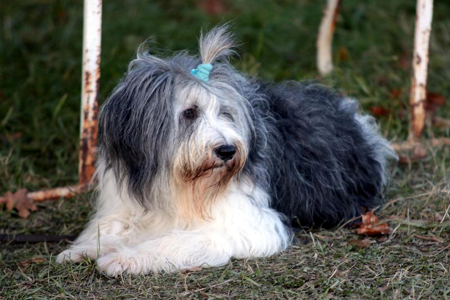PONS and
children can be a
heartwarming combination in most cases. They
really can be good friends, and both benefit
from this loving relationship.
However there
are specific guidelines that parents who are
dedicated pet owners must observe in all
situations. Why is this ? As loving and loyal
as PONS can be, they are still canines, with a
limited capacity for complex thoughts which are
part of their species.
Please bear in mind that young
children must never be left alone with a dog.
The type of play which excites a dog needs to be
discouraged and dogs need to be trained to
understand their place in your family. There
should be no exceptions to this guideline.
Families who
live by these guidelines, will have an extremely
rewarding relationships with their PONS for many
years.
Some people
may think that it an anomaly when we hear
stories of family pets attacking children and
nevertheless, parents still choose to bring dogs
into their families with little thought of the
possible adverse consequences.
Most families with a dog will thankfully never
have to deal with any of the terrible situations
we hear about in the news media.. Dogs generally
love people and most dogs love children.
Children tend to love dogs as much as their
parents do, and it is very doubtful that after
thousands of years the connection between canine
and humankind will be broken. However, children
do become upset and behave in unreasonable ways
around their pets. When my Shakey was only one
year old, my foster daughter became angry and
slapped him across the face. Fortunately, his
good temperament saved him and he looked at her
in distain and walked away. This took place very
quickly, but I will never forget it.
How do you create the best possible environment for your children and your
PON so that you won't need to worry unduly about
unexpected tragedy.
Experts generally agree upon at least three
points which must be taken when bringing a dog
into a household with children.
First, be sure that very young children, as well
as older children who may display immature, or
impulsive, behaviors, are NEVER left alone with
your PON. Your
PON is unlikely to suddenly
attack, but a dog - like a small child itself -
will not always choose the best response when it
is unintentionally teased, harmed or threatened
in play. You wouldn't leave small children
unattended in play for more than a few seconds
or minutes (depending upon their age). So if
your child and your dog are together, you should
be even more vigilant, as the potential for
accidents is at least doubled. In the case with
Shakey, I was on the scene, but nevertheless, my
foster daughter became upset in an instant when
things did not go her way and she took it out on
him.
Secondly, you should discourage roughhousing
with your PON. PONS in general have good
temperaments, but they may become upset in
certain situations.
Thirdly, ensure that your family PON
is moderately well trained. While some trainers
may feel that the owner is adequately qualified
to take on this task, you may wish to consider
having your PON professionally trained. In my
case, Shakey's breeder worked with him before
sending him to me at the age of four months.
Aggression
can happen with even the most loving owners when
incorrect training, or improper handling of the
dog is not addressed when they are puppies.
Working with your PON breeder may give
you greater peace of mind you are looking for
when selecting a PON puppy for your
children. Alternatively, if you train your PON
yourself, you need to ensure that the PON
understands that you are the top dog, and that
he is not above your children in your family's
pecking order. Good luck and please keep us
updated.

